Lentil with lemon salad
Lentil with lemon salad gives these wonderful but largely flavourless legumes, rich in protein, a piquant-taste. Let's be honest; without some help they are not a food you would normally recommend.
However the demands of a planet that must survive the onslaught of mankind makes it sensible to eat more legumes; and a people who have no desire to die from the dreaded diseases associated with feedlot red-meat. That means beans, peas and lentils.
Added to that the lemon gives your supper a boost, not only in flavour but also because it is rich in vitamin C. It is one of the four that are absolutely essential if we are to avoid frailty syndrome; and two phytonutrients, limonin and beta-cryptoxanthin that have been strongly associated with the prevention of senility.
The beauty of lentils is that unlike other dried legumes, being tiny they take only twenty minutes to cook.
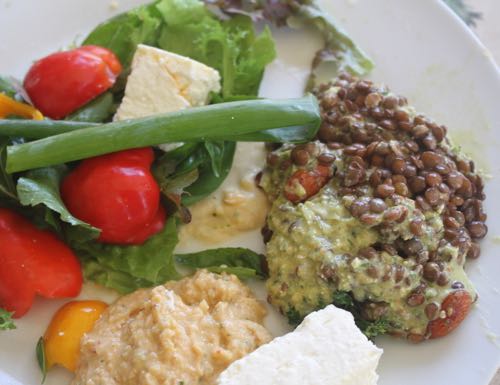 Lentil, hummus and a vibrant salad
Lentil, hummus and a vibrant saladHow to get more fiber is a burning question in a world with rapidly expanding colo-rectal cancer. There are many options but they all involve returning to the foods that our great grandparents ate; split peas below just take longer to cook.
This lentil with lemon salad incorporates many of the concepts enshrined in the longevity diet; protein mainly from legumes, zero refined carbs and high in the fruit oils.
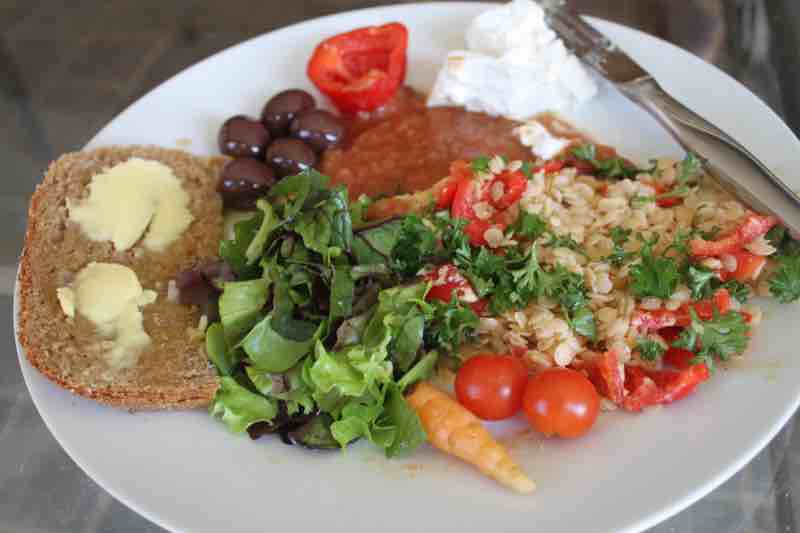
You will need
- Roughly a cup of dried-lentils; red and yellow are my favourites.
- Half a lemon or lime; include the pulp.
- A red-pepper, with the seeds removed if it is too hot.
- Olive-oil.
- A handful of green herbs such as parsley, cilantro and rocket.
Go for it
- Put your cup of lentils in a pot, add hot-water and bring to the boil. Allow to simmer for about 20 minutes; until nearly tender but not mushy. There is no need to soak them.
- Drain off the excess hot liquid and rinse in a strainer with cold-water.
- Chop up your handful of parsley or other green herb; and a red chili pepper without the seeds.
- Use a stick-blender to mush up your lemon, a couple tablespoons of extra virgin olive oil and a touch of S&P.
- In a large bowl stir up the lentils with the chopped-parsley and pepper; pour the liquid over the whole.
- From start to finish you should need no more than twenty-five minutes to prepare this wonderful nutritious lentil with lemon salad dish.
Experiment with rinsing your lentils with cold water. Those anxious about anti-nutrients would insist; however I find that hot legumes soak up the rich olive oil mixture better.
Vegetarians' bones are no weaker despite all the anti-nutrients they eat.
Vegans do have to be careful though; brittle bone disease lurks. It may have to do with a vitamin B12 deficiency.
Some cooks like to retain the cooking liquid after preparing legumes; they say it gives the dish more flavour. That's for those not unduly anxious about anti-nutrients.
As a variation add feta cheese before blending and perhaps top it with lightly-roasted almonds in olive oil. With a slice of our artisan bread it will make a complete meal.
Probably not needed but here are more details about the best way to cook lentils.
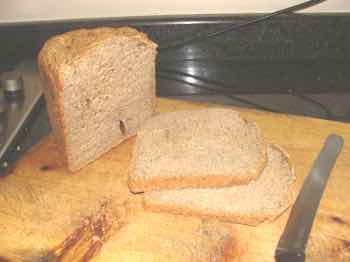
Pepperdews
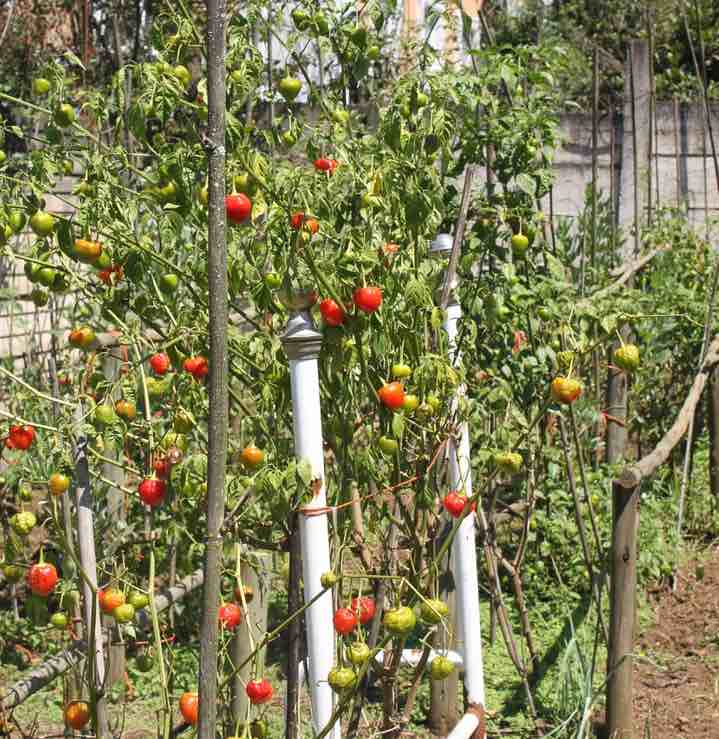
Peppadews are our favourite because they are easy to grow, with some bite but they will not blow your head off. Cut out most of the seeds if you do not like hot chilli; but that is where much of the anti-inflammatory capsaicin is to be found. We enjoy them daily to spice up our legumes.
Growing peppadews is not difficult. They bear for months. Freeze them and you have a ready supply year-round.
Lemon
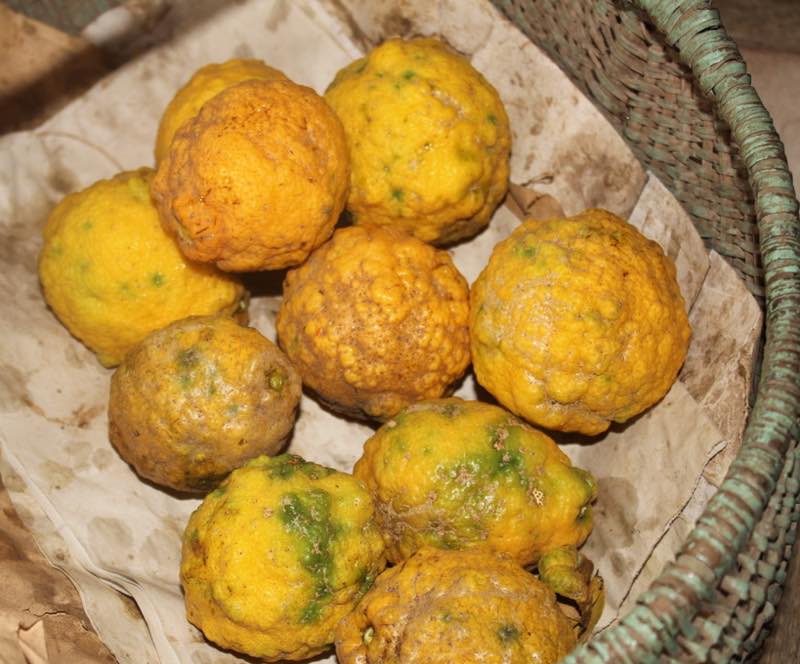
Citrus fruits such as lemon and lime are the richest source of vitamin-C. Once they have been pasteurized and turned into OJ they lose more than half of their value.
The old saying was the first thing to do when moving into a new home is to plant a grafted lemon-sapling[3]; it still holds. One tree will provide you with several hundred fruit per annum for thirty years or more.
Just price them at the supermarket and do some simple mathematics; a lemon tree is a far better investment than the fickle stock-exchange.
More important lemons and limes provide strong support for our immune-systems, so vital at every season.
You will eat a lot more lemons if you have them growing in your garden.
Freezing lemon juice is another option if you have a surplus.
Supper
Our supper tonight consisting of lentil with lemon salad, avocado and hummus may look like a dog's breakfast but the flavour and nutrition are overwhelmingly fine. Add a slice of whole grain bread, a tablespoon of tomato relish and perhaps some feta-cheese; you have a very satisfying meal.
One-third of a cup of lentils contains only 13g of complex carbohydrate[1] and 6g of fibre, a quarter of your daily requirement according to the American Heart Association; most of us consume less than a half of what we should. That is another reason why all the nasty bowel diseases abound; and a depleted microbiome.
How to get more fiber is an important subject for all of us. Let your toiletries direct you; I personally have a lazy colon and need at least 35 grams per day.
If you are concerned about starches and frankly we all need to be careful, learn more about net-carbs.
I love my food and dishes like this are low in carbohydrate so I do not have to hold back.
Legumes
Legumes have vast benefits for both ourselves and the planet. They are a rich source of plant protein, enabling us to reduce our reliance on red meat. They have plenty of fibre; and resistant starch that feeds the so-important microbiota in our alimentary canals. They help with the passage of the stool, minimising constipation and the risk of colorectal malignant disease.
The cancer association incidentally recommends a whole grain and a legume at every meal. Three times daily might seem over the top but could you manage it at least once a day?
Lentils are a good source of minerals including iron. Whenever donating blood I am rather anxious about my haemoglobin levels since I eat so little red-meat but no, it is never a problem; in fact it's on the high side of normal.
Just for the record we are not vegetarians but our commitment to the Cyan Zones[4] means getting more of our protein from dishes like this lentil with lemon salad; caring for ourselves and Mother Earth.
Anti-nutrients
There are some concerns about so-called antinutrients; phytates, lectins and tannins that inhibit the absorption of minerals. Fortunately most of them can be removed by soaking, rinsing several times and boiling your legumes.
Learn more about this topic at cooking chickpeas, one of our favourites that we enjoy every single day. They too are a very inexpensive source of protein.
Personally with the exception of lentils and chickpeas we prefer green legumes; they have far fewer lectins, are quick to cook and are a tastier option in my opinion. So we grow them year-round in our mild climate and enjoy them daily.
Young broad beans straight from the garden are probably my favourite, not least because they play such an important role in preventing and treating Parkinson's disease. Interestingly they are eaten in all five blue zones of the planet where most folk live into strong and vital old-age; longevity is the word. To be eagerly sought if you have all your faculties but dread relying on the supermarket for food.
I said at the beginning of this section that legumes unlike cattle are good for the planet; nitrogen fixation bacteria attach to their roots improving the quality of our soils. They require one-tenth of the water needed to provide the same amount of protein from red meat.
I think we should acknowledge that legumes are not renowned for their great flavour; we eat them because they are good for us. Generally they do need a little help from lemon juice, garlic and peppers to make them more palatable.
I always say in my talks that we have been hoodwinked into thinking we need eat only those foods that we find absolutely scrumptious. That is why in my opinion we are nutritionally-deficient and sickly; chronic, inflammatory and malignant diseases are so prevalent. Here are just three examples of those enjoying typical grocery store fare.
- Only 5% get the recommended amount of fibre.
- Only 25% are getting sufficient magnesium.
- 90% of the elderly are not getting the RDA of folate and B12.
Eat more legumes like this lentil with lemon salad. It's about balance; we are not vegetarians but red meat from a feedlot is not to my liking.
If I could be assured of grass-fed beef I would be more enthusiastic about small amounts of red meat.
Weight-loss
"Do not eat any refined-carbs, period."
Dr Atkins
Scientists have found that the Atkins way was the most effective of the four diets researched[2]. They reported that participants found it extremely difficult to adhere to a low carbohydrate plan indefinitely; however they could manage by avoiding refined-starches but allowed to enjoy whole grains with legumes like lentils and beans.
The longevity diet is also not difficult to follow, designed for those who have the desire to enjoy vigorous and healthy lives right into their eighties and nineties.
That's where we are; around 120g of carbs per day but very close to zero refined-starches. It is the reason we bought a wheat mill; giving up bread for ever seemed overwhelming and proved unnecessary.
Understanding net-carbs will be a big help.
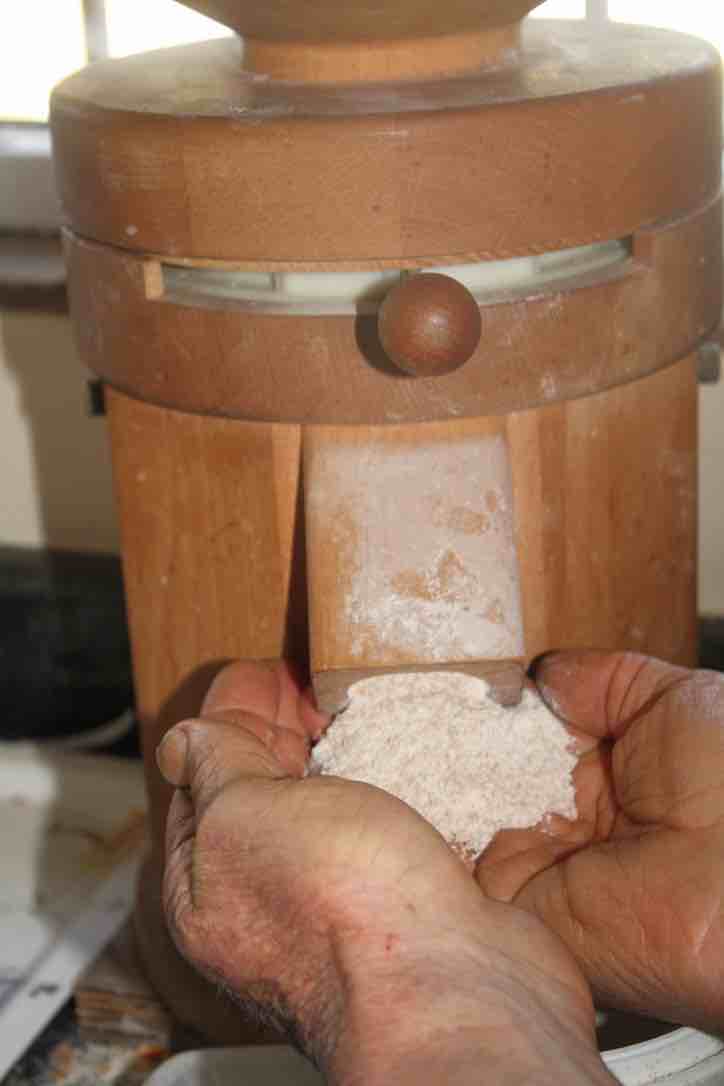
For example 100% whole grain bread and corn on the cob would be
allowed, even encouraged; but commercial loaves and what South Africans call maize-meal certainly are not.
"The AMA reports that those who simply added one cup of legumes to their diet every day, with no other restrictions, lost on average 5.7 pounds in three months."
Green rather than dried legumes are much nicer generally.
Young broad beans straight from the bush are my favourite.
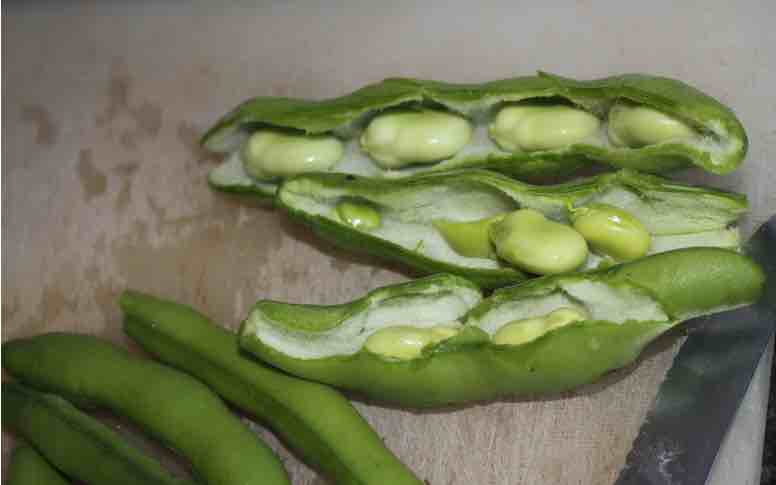
Enjoy your lentil with lemon salad and a cup of this spicy ginger-tea recipe on the side. To appreciate these wonderful foods you must have ready access to citrus fruit; choose one today if you live in a mild climate.
Read more from our tree planting help page.
Lentil with lemon salad
Always include the pulp with your lemon for the lentil-salad; and many other dishes. That is where at least half of the nutrients are to be found.
Read more about how to avoid the dreaded frailty syndrome; nobody wants to be old before their time. There are some simple things you can do to prevent it. More vitamin-C from citrus and peppers is part of the solution.
"What could I get from the strength of their hands, men whose vigour is gone?"
- Job 30
Whilst we are not vegetarians, we do believe that getting much of our protein from legumes is essential both for ourselves and the planet. We call it the cyan zone lifestyle; a mixture of blue and green issues.
For a small variation this is the best way to cook lentils.
This lentil potage is another great favourite; it can be cooked in such a short time.
When browsing use right click and "Open Link in New Tab", or you may get a bad gateway signal.
What are the main symptoms of colorectal cancer?
Our thoughts of course lie with what we could and should be doing long before the main symptoms of colorectal cancer begin; all of those suffering from chronic constipation take note.
The main symptoms are usually vague; a change in bowel habits is probably the most important. Blood in the stool and difficulty finishing your business are other signs. If there is unexplained weight loss too, then there is serious need to consult your doctor; today.
The material expressed on this page is gleaned from the nutritional and environmental literature; it is clearly referenced. A plain distinction is made between the author's opinion and that which is scientifically proven. When in doubt consult your health professional.
To suggest a correction or clarification, write to Dr Bernard Preston here. Contact.
Newsletter
Our newsletter is entitled "create a cyan zone" at your home, preserving both yourself and Mother Earth for future generations; and the family too, of course. We promise not to spam you with daily emails promoting various products. You may get an occasional nudge to buy one of my books.
Here are the back issues.
- Lifestyle and ideal body weight
- What are ultra-processed foods?
- Investing in long-term health
- Diseases from plastic exposure
- Intensive lifestyle management for obesity has limited value
- A world largely devoid of Parkinson's Disease
- The impact of friendly bacteria in the tum on the prevention of cancer
- There's a hole in the bucket
- Everyone is talking about weight loss drugs
- Pull the sweet tooth
- If you suffer from heartburn plant a susu
- Refined maize meal and stunting
- Should agriculture and industry get priority for water and electricity?
- Nature is calling
- Mill your own flour
- Bake your own sourdough bread
- Microplastics from our water
- Alternative types of water storage
- Wear your clothes out
- Comfort foods
- Create a bee-friendly environment
- Go to bed slightly hungry
- Keep bees
- Blue zone folk are religious
- Reduce plastic waste
- Family is important
- What can go in compost?
- Grow broad beans for longevity
- Harvest and store sunshine
- Blue zone exercise
- Harvest and store your rainwater
- Create a cyan zone at your home
Did you find this page interesting? How about forwarding it to a friendly book or food junkie? Better still, a social media tick would help.
Address:
56 Groenekloof Rd,
Hilton, KZN
South Africa
Website:
https://www.bernard-preston.com